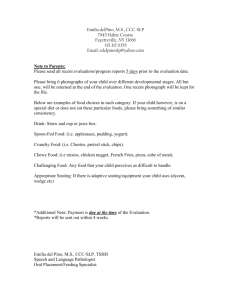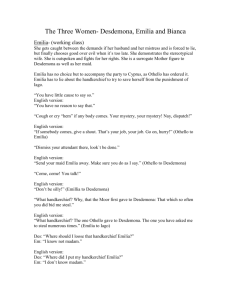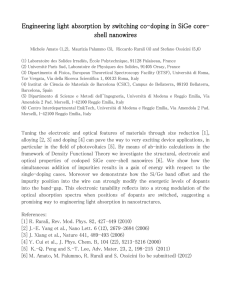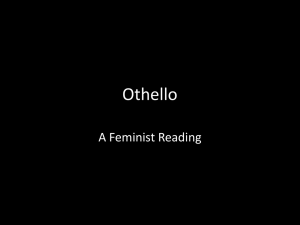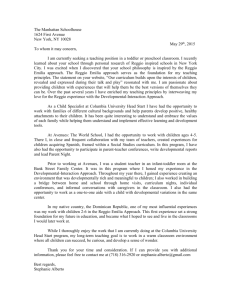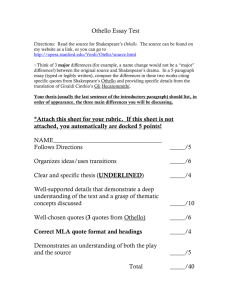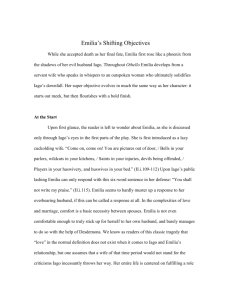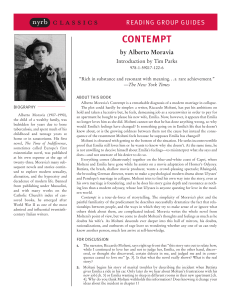Evan L. Wendel 9-20-06 CMS.796: Major Media Texts Close
advertisement
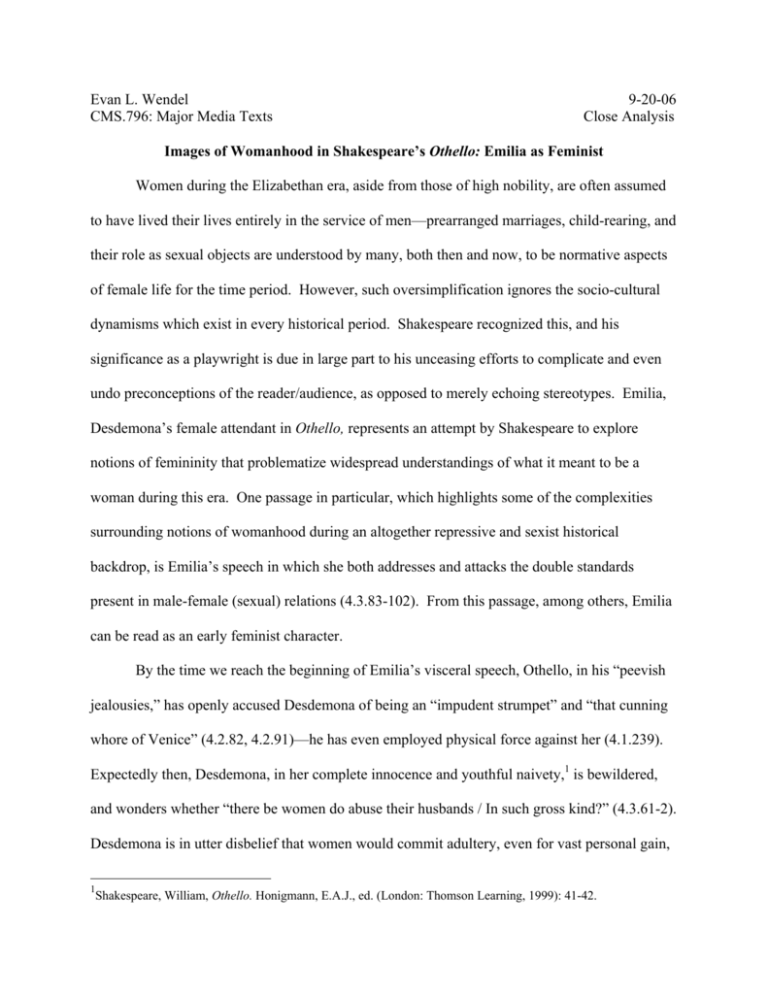
Evan L. Wendel CMS.796: Major Media Texts 9-20-06 Close Analysis Images of Womanhood in Shakespeare’s Othello: Emilia as Feminist Women during the Elizabethan era, aside from those of high nobility, are often assumed to have lived their lives entirely in the service of men—prearranged marriages, child-rearing, and their role as sexual objects are understood by many, both then and now, to be normative aspects of female life for the time period. However, such oversimplification ignores the socio-cultural dynamisms which exist in every historical period. Shakespeare recognized this, and his significance as a playwright is due in large part to his unceasing efforts to complicate and even undo preconceptions of the reader/audience, as opposed to merely echoing stereotypes. Emilia, Desdemona’s female attendant in Othello, represents an attempt by Shakespeare to explore notions of femininity that problematize widespread understandings of what it meant to be a woman during this era. One passage in particular, which highlights some of the complexities surrounding notions of womanhood during an altogether repressive and sexist historical backdrop, is Emilia’s speech in which she both addresses and attacks the double standards present in male-female (sexual) relations (4.3.83-102). From this passage, among others, Emilia can be read as an early feminist character. By the time we reach the beginning of Emilia’s visceral speech, Othello, in his “peevish jealousies,” has openly accused Desdemona of being an “impudent strumpet” and “that cunning whore of Venice” (4.2.82, 4.2.91)—he has even employed physical force against her (4.1.239). Expectedly then, Desdemona, in her complete innocence and youthful naivety,1 is bewildered, and wonders whether “there be women do abuse their husbands / In such gross kind?” (4.3.61-2). Desdemona is in utter disbelief that women would commit adultery, even for vast personal gain, 1 Shakespeare, William, Othello. Honigmann, E.A.J., ed. (London: Thomson Learning, 1999): 41-42. 2 made explicit when she asks: “Wouldst thou do such a deed for all the world?” (4.3.67), to which Emilia responds: “The world’s a huge thing: it is a great price / For a small vice” (4.3.68-9). Such logic illuminates a distinct contrast to masculine perceptions in which women who commit adultery were thought to be motivated exclusively by fickle lust and sexual appetite; here we witness Emilia carefully calculating the risks/rewards of such a scenario—she approaches the situation with reasoning more in line with the stratagems of kings and generals (i.e., maleness). Desdemona, perhaps in a last ditch effort to remind herself that she has in fact remained faithful to Othello, says, “I do not think there is any such woman” (4.3.82), despite the fact that throughout the scene Emilia’s responses indicate she is talking to such a woman. Emilia functions here not as a passive woman whose purpose is to do the bidding of men, but rather represents an active, free-spirited and strong symbol of womanhood. In terms of the number of women who would abuse their husbands, she states there are “a dozen, and as many to th’ vantage as would / store the world they played for.” Emilia begins with a blatantly sarcastic understatement, perhaps because she grows anxious over Desdemona’s naivety, but then quickly suggests that all women at some point would consider being unfaithful to their husbands if the circumstances were ideal. In the final scene of the play, she even goes so far as to disobey Iago’s call to “hold [her] peace!” claiming that she will “speak as liberally as the north”2 in revealing her husband’s villainous plot (5.2.216, 5.2.218). Returning to Emilia’s speech we find that she relocates blame for infidelity in male-female sexual relations upon the male, saying, “But I do think it is their husbands’ faults / If wives do fall,” and that it is “that they slack their duties / And pour our treasures into foreign laps.” Her language is nuanced and expresses a great deal of feminist intent, especially with respect to her use of the word “our,” which implies ownership. 2 Emphasis added. My claim that Emilia is free-spirited and unconstrained by men is bolstered by word choice. 3 Much in the same way that men frequently speak of women as objects of possession, Emilia complicates matters by suggesting that the reverse must also be true—men, and specifically their “treasures” (i.e, seed, or semen) are the possession of women. Moreover, she views women who engage in extramarital affairs as doing so reactively, that is, only when their husbands have not fulfilled their obligatory sexual duties. Emilia perceives men to be both deprave and base, including her own husband, Iago, having earlier stated: “’Tis not a year or two shows us a man. / They are all but stomachs, and we all but food” (3.4.104-5). Men see women as consumable sexual objects, to be used when desired, and ignored when other matters arise. Emilia inverts these sexist sentiments in order to break them down, whereby she can be read as a symbol of defiance who consciously casts aside the one-sided nature of male dominated culture. Shakespeare goes even further, carefully exposing the emotional range and depth of women that parallels, and perhaps even transcends that of men. Emilia elaborates: “Let husbands know / Their wives have sense like them,” thereby positing that women exhibit a sensorial and emotional consciousness3 that at the very least matches that of men. Women cannot be defined by “grace,” gentleness, and other similar stereotypes of femininity alone; Shakespeare understands that they too “have galls,” or resentments, and are by extension capable of “some revenge” themselves. Emilia reiterates these complexities in posing a series of rhetorical questions which expose the ridiculous nature of double standards in male-female (sexual) relations: “And have not we affections? / Desires for sport? and fraility, as men have?” In other words, she offers the reader/audience a more thoroughly humanized version of womanhood, in which the emotional complexities, desires and hardships of women are equivalent to those of men. Shakespeare is directly questioning dominant views in which 3 Shakespeare, William, Othello. Honigmann, E.A.J., ed. (London: Thomson Learning, 1999): 295, see footnote 93. 4 women are seen as the inferior and subservient, and calling attention to gender issues as a sites of cultural transformation. Emilia recognizes and plays on notions of male “use” of the female as object, inverting and poking fun at the double standards women faced during the Elizabethan era. If men espouse ownership of women and their bodies, then Shakespeare’s Emilia—an early embodiment of feminism—gives us fair warning that they do so at their own peril.
